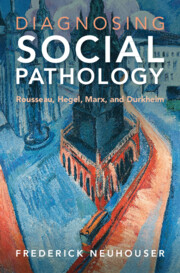Book contents
- Diagnosing Social Pathology
- Diagnosing Social Pathology
- Copyright page
- Dedication
- Contents
- Preface
- Note on Citations
- Chapter 1 Can Societies Be Ill?
- Chapter 2 Society as Organism?
- Chapter 3 Marx: Pathologies of Capitalist Society
- Chapter 4 Marx: Labor in Spiritual Life and Social Pathology
- Chapter 5 Plato: Human Society as Organism
- Chapter 6 Rousseau: Human Society as Artificial
- Chapter 7 Durkheim’s Predecessors: Comte and Spencer
- Chapter 8 Durkheim: Functionalism
- Chapter 9 Durkheim: Solidarity, Moral Facts, and Social Pathology
- Chapter 10 Durkheim: A Science of Morality
- Chapter 11 Hegelian Social Ontology I: Objective Spirit
- Chapter 12 Hegelian Social Ontology II: The Living Good
- Chapter 13 Hegelian Social Pathology
- Chapter 14 Conclusion: On Social Ontology
- Bibliography
- Index
Chapter 12 - Hegelian Social Ontology II: The Living Good
Published online by Cambridge University Press: 07 October 2022
- Diagnosing Social Pathology
- Diagnosing Social Pathology
- Copyright page
- Dedication
- Contents
- Preface
- Note on Citations
- Chapter 1 Can Societies Be Ill?
- Chapter 2 Society as Organism?
- Chapter 3 Marx: Pathologies of Capitalist Society
- Chapter 4 Marx: Labor in Spiritual Life and Social Pathology
- Chapter 5 Plato: Human Society as Organism
- Chapter 6 Rousseau: Human Society as Artificial
- Chapter 7 Durkheim’s Predecessors: Comte and Spencer
- Chapter 8 Durkheim: Functionalism
- Chapter 9 Durkheim: Solidarity, Moral Facts, and Social Pathology
- Chapter 10 Durkheim: A Science of Morality
- Chapter 11 Hegelian Social Ontology I: Objective Spirit
- Chapter 12 Hegelian Social Ontology II: The Living Good
- Chapter 13 Hegelian Social Pathology
- Chapter 14 Conclusion: On Social Ontology
- Bibliography
- Index
Summary
Chapter 12 examines Hegel's characterization of human society as the "living good," which expresses his version of the analogy between societies and organisms. For him the analogy implies that societies both incorporate processes of life (in carrying out the activities necessary for material reproduction) and possess the same structure as biological life (that of a "self-positing" subject, which maintains itself by positing "contradictions" internal to itself and then negotiating them so as establish its own identity). Hegel also insists on the differences between life and social being: the presence in social life of self-consciousness and the capacity for freedom. Thus, societies are normatively and functionally constituted living beings that realize the good via specialized, coordinated functions, which, unlike the activities of organisms, are infused with ethical content deriving from their potential to be consciously self-determined. Analyzing Hegel's master–slave dialectic illustrates these ontological claims.
Keywords
- Type
- Chapter
- Information
- Diagnosing Social PathologyRousseau, Hegel, Marx, and Durkheim, pp. 281 - 311Publisher: Cambridge University PressPrint publication year: 2022

